|
|
SOUTHERN & GULF RAILROAD



Nov 7, 2021 (original sep 2011)
do you share my problem, that the electric drills are always
in the way? you use them frequently, so it is no idea to put
them in their box after each use? well, if you live where
milk comes in bags instead of bottles, you can get the pots,
the bags are put in. just carve a hole in the bottom, make
two holes in the side and screw it to the wall or the shelf.
the drills are near, ready to use, but out of the way. you
can even leave the drill bit put.

 ..............................
.............................. .............................. ..............................

july,30 2011
as i got just a handfull of LGB's yellow connectors, but
need dozens, i had to come up with something homemade.
after trying to glue rails together with two part epoxy, and
realizing that i would not like to glue my turnouts
permanently to the rails, i tried this:
cable connectors of the right size, without the metalparts.
first i split the plastic on the roundish underside. but if
one splits on the side, where the screws were, the connector
stays free of the wheels.
for separating the rail ends, i will use one "drop" of
silicone sealer.
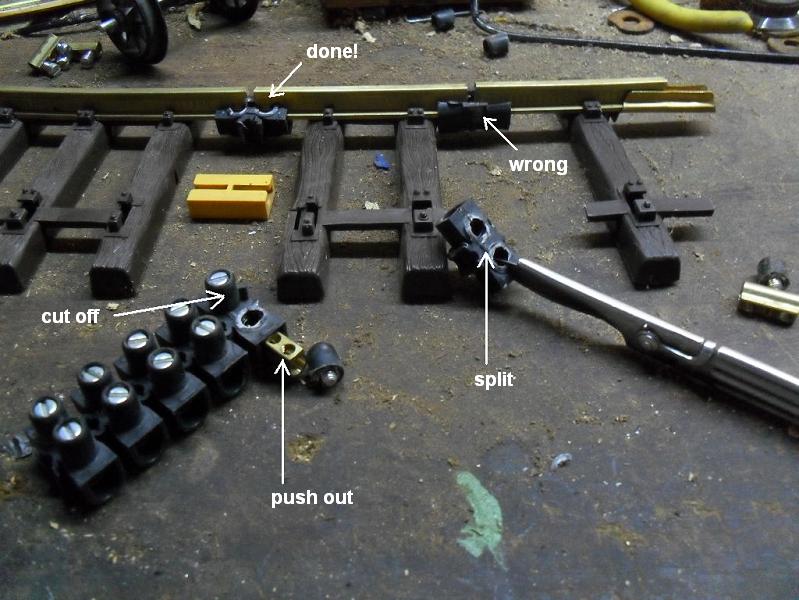
 ..............................
.............................. .............................. ..............................

march, 2, 2011
how to build cheap freight for your layout:
just print out these pics, cut them out, fold and glue them.
copyright by me - you may use my templates freely for non
commercial uses.
(if you change them for more variations, please send me
copies to korm( circle-a )kormsen.info)
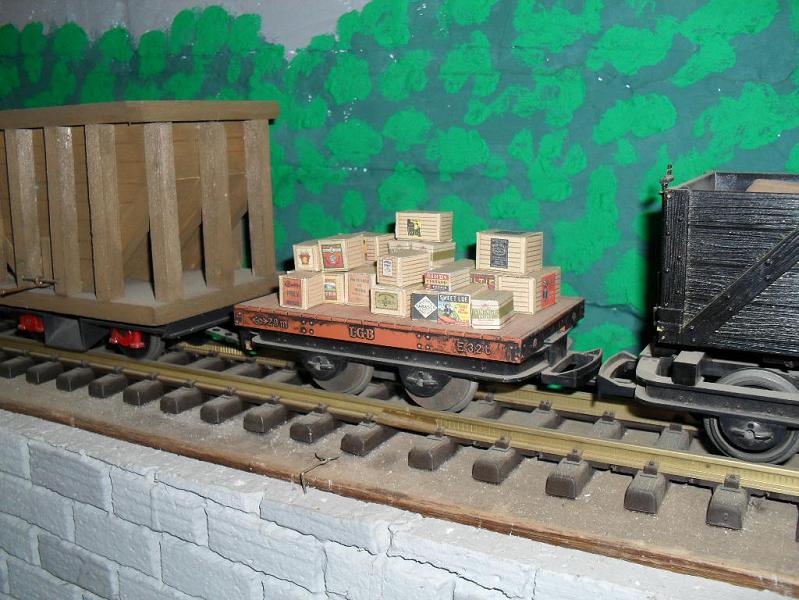
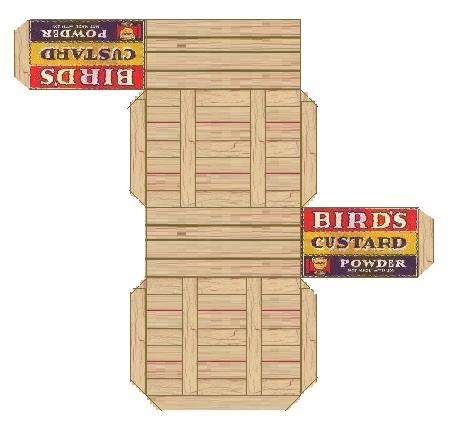
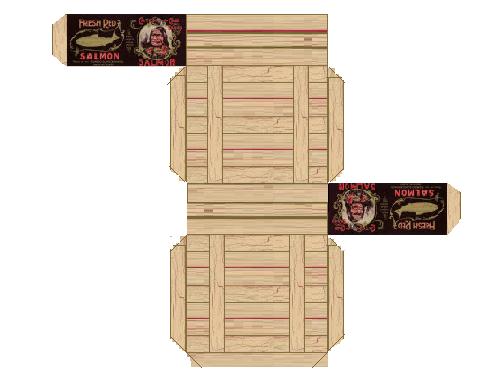
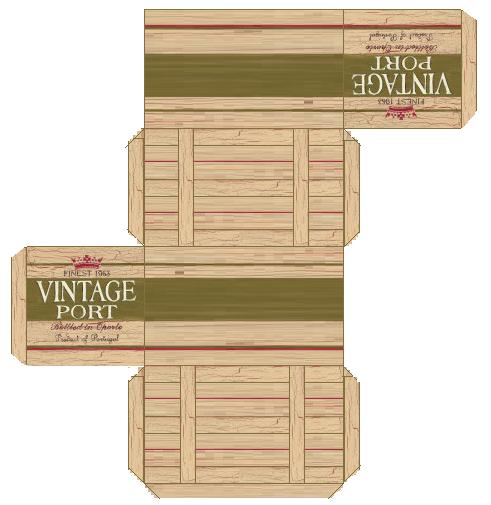 some more boxes of the same kind:
some more boxes of the same kind:
boxes
1
boxes
2
boxes
3
boxes
4
 ..............................
.............................. .............................. ..............................

well, can't let my birthday go by, without putting something
to the site. it's nothing new, just a token, that the site
is like its owner - not dead yet.
just a cheap way to make link and pin couplers.
the pins are made just by cutting a fishing hook.
the couplers are made out of cooler ribs one can find in old
computers. giving them their form with a file and drilling a
hole. done.
for those of you, who are grandfathers: a fine source for
links are the plastic chains, stressed mothers use to pin
suckergums to their babies...
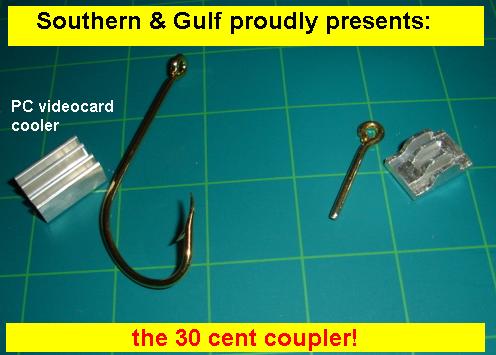
 ..............................
.............................. .............................. ..............................

marking foam
to make stonewalls of foam or styropor i like to use weak
welding irons for marking the individual stones.
the problem is, that even the weakest irons give much heat.
so one has to move the iron quick for not to make too broad
marks.
now i got an idea. and it works.
(at least for places, where the electricity has 220 Volts)
many telephones and other things need 110 V.
so i got a couple of transformers disponible.
i simply put a small transformer between the 220 V outlet
and the 220 V welding iron.
now i got a warm, not a hot iron for marking.
i can draw finer lines and can take my time, doing it.
 ..............................
.............................. .............................. ..............................

homespun wheels
under some of my cars i put "homemade"* weels.
those on the left side of the pic are turned from a solid
plastic rod. aixle and weels made from one part of material.
those on the right side are individually turned weels from
ordinary iron/steel, connected with two plastic pipes out of
one of the junkboxes.
the plasticweels are from white plastic, coloured with a
black marker (about ten years ago), the ironweels begin to
show some real rust.
(*)"homemade" in this case refers to the village smith. i
have no mashine for that.
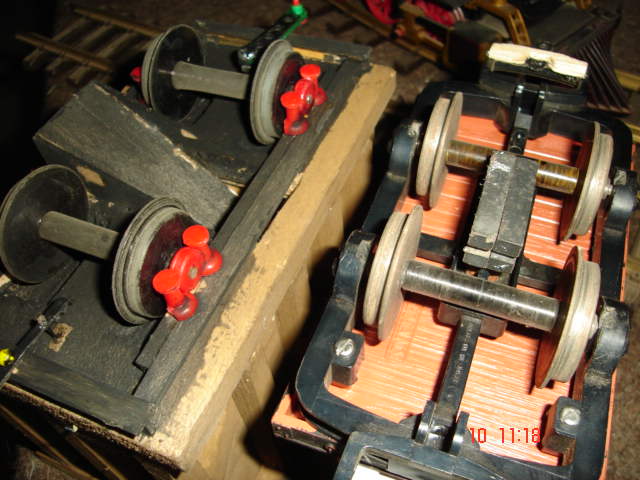
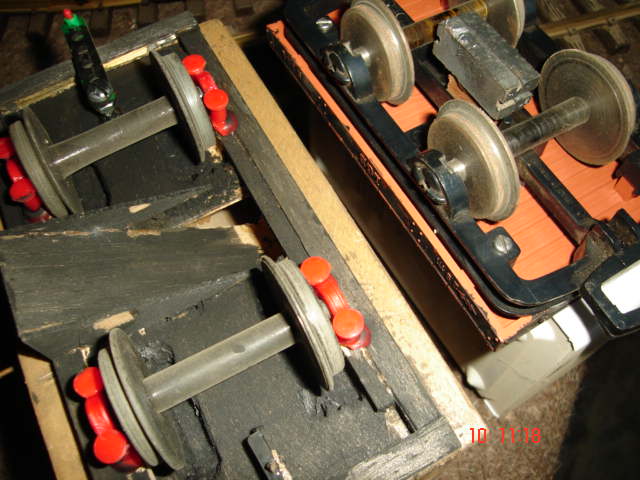
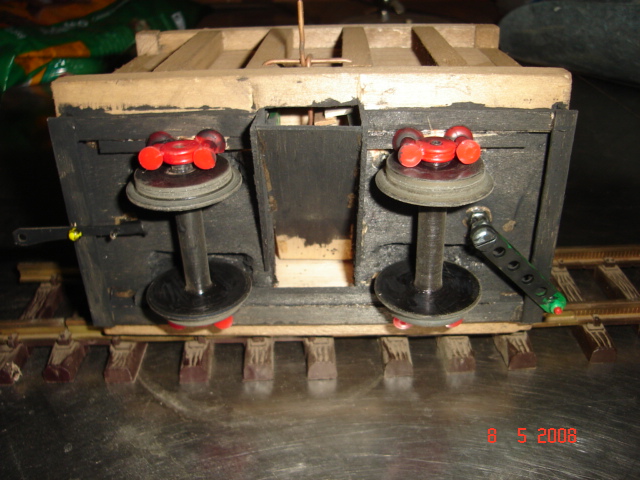
 ..............................
.............................. .............................. ..............................

insert movie

This site is © Copyright Korm Kormsen 2010 to 2021,
All Rights Reserved.
Website templates
|
|



30. juli 2011
da ich nur eine handvoll gelber isolier schienenverbinder
habe, aber dutzende brauche, musste ich mir was einfallen
lassen.
die loesung sind die isolierungen von kabelklemmen in der
passenden groesse.
eigentlich sollte das bild selbsterklaerend sein.
es ist nur eines zu beachten: wenn man den laengsschnitt an
der (weniger haesslicheren) unterseite macht, rutscht der
verbinder so hoch, dass die radkraenze dran stossen. also
die seite mit den loechern nach oben!
die schienenkoepfe werden mit etwas silikon versiegler
getrennt.

2.3.11
Wie kriegt man billige Fracht fuer die Anlage?
Einfach diese Bilder ausdrucken, falten und kleben.
copyright liegt bei mir.
Die Vorlagen koennen zu Privatzwecken frei benutzt werden.
(wenn mehr Variationen gemacht werden, bitte ne Kopie an
mich. (korm(kreisel-a)kormsen.info)
noch ein paar mehr Kisten der gleichen Art:

Ich kann meinen Geburtstag einfach nicht verstreichen
lassen, ohne wenigstens eine Kleinigkeit an der Seite zu
tun.
nichts Neues, nur ein Zeichen, dass die Seite ist, wie ihr
Eigner - noch nicht tot.
nur eine billige Methode, Stöckelkupplungen zu machen.
Die Stoeckel sind einfach abgekniffene Angelhaken.
Die Kupplungen sind aus Kuehlrippen, wie man sie in alten
Computern findet. Einfach mit einer Feile in Form bringen
und vorsichtig bohren. Fertig.
Tip fuer Grossvaeter: die Plastikketten, mit denen
gestresste Muetter die Schnuller an den Babies festmachen,
geben gute Verbindungsglieder.
Schaumstoff markieren
Um aus Styropor oder anderem Schaumstoff Steinwaende zu
machen, benutze ich schwache Loetkolben, mit denen ich die
einzelnen Steine herausarbeite.
Aber selbst die schwaechsten Kolben werden zu heiss.
Nun hatte ich eine brauchbare Idee. (zumindest fuer Laender,
wo 220V benutzt wird)
Viele Telefone und Anderes benoetigen 110 Volt. Also hab ich
eine ganze Reihe Transformatoren gesammelt.
Ich stecke einfach einen Transformator zwischen die 220 V
Steckdose und das 220 V Loeteisen.
Nun habe ich keinen heissen, sondern einen warmen
Loetkolben.
Damit kann ich feiner arbeiten und mir mehr Zeit lassen.

hausmacher Raeder
Unter einigen Wagen hab ich "hausmacher"* Raeder.
Bei denen links auf den Fotos sind die ganzen Achsen mit
Raedern aus einer soliden Plastikstange herausgedreht.
Die auf der rechten Seite sind einzeln aus StangenEisen
gedreht, und jeweils mit einem Plastikrohr aus der
Bastelkiste verbunden.
Die Raeder/Achsen aus weissem Plastik habe ich damals (vor
zehn Jahren) mit schwarzem Filzstift bemalt, die Eisenraeder
beginnen nun langsam etwas Flugrost zu zeigen.
(*) "hausmacher" bezieht sich in diesem Fall auf unseren
Dorfschmied. Ich hab keine Drehbank.

|
|

